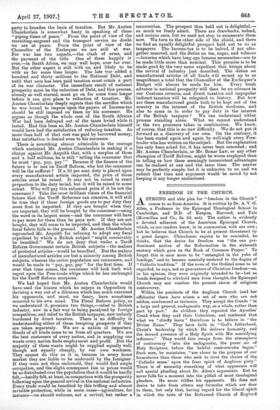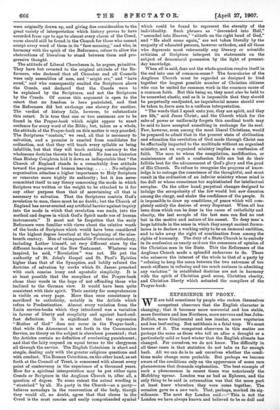FREEDOM IN THE CHURCH.
A STRONG and able plea for "freedom in the Church" comes to us from America. It is written by Dr. A. V. Allen, a Professor in the Episcopal Theological School iu Cambridge, and D.D. of Kenyon, Harvard, and Yale (Macmillan and Co., 6s. 6d. net). The author is evidently a devoted adherent of the American Episcopal Church, which, as our readers know, is in communion with our own ; but he believes that Church to be at present threatened by a great danger. Churchmen require to be reminded, he thinks, that the desire for freedom was "the one pre- dominant motive of the Reformation in the sixteenth century which gave us the Book of Common Prayer.". To forget this is once more to be "entangled in the yoke of bondage," and to become mentally enslaved to the dogma of " Catholic tradition." If the vows of the Ordinal come to be regarded, Le says, not as guarantees of Christian freedom—as, in his opinion, they were originally intended to be—but as bonds designed to withhold men from thought, the Episcopal Church may not weather the present storm of religious controversy.
Within the precincts of the Anglican Church (and her offshoots) there have arisen a set of men who are not seldom condemned as insincere. They accept the Creeds " in a large and general, undogmatic way, as a whole, rather than part by part." As children they repeated the Apostles Creed when they said their Catechism, and confessed that what we "chiefly learn" therefrom is to believe in "the Divine Name." They have faith in "God's fatherhood, Christ's leadership by which He delivers humanity, and the inward presence of a Holy Spirit with His sanctifying influence." They would fain escape from the atmosphere of controversy "into the undogmatic, the purer air of Holy Scripture, before the baleful controversies begun." Such men, Le maintains, "are closer to the purpose of our formularies than those who seek to rivet the chains of the ' Catholic sense' upon the freer spirit of Anglican piety." There is of necessity something of what opponents will call special pleading about Dr. Allen's arguments. But he never falls for a moment into the pitfall of most theological pleaders. He never vilifies his opponents. He does not desire to take from others any formulas which are dear to them, but only that, having -regard for the liberal spirit in which the teats of the Reformed Church of England
were originally drawn up, and giving due consideration to the great variety of interpretation which history proves to have accorded from age to age to almost every clause of the Creed, room should still be found in the Church for those who cannot accept every word of them in its "face meaning," and who, in harmony with the sph3t of the Reformers, refuse to allow the obstructions of literalism to stand between them and pro- gressive thought.
The attitude of Liberal Churchmen is, he argues, primitive. They have but reverted to the original attitude of the Re- formers, who declared that all Churches and all Councils were only assemblies of men, and "might err," and "have erred," and who consequently exalted the Scriptures above the Creeds, and declared that the Creeds were to be explained by the Scriptures, and not the Scriptures by the Creeds. Of course this argument is open to the retort that no freedom is here postulated, and that the Reformers did but exchange one slavery for another. The verdict of history fails, however, to substantiate this retort. It is true that one or two sentences are to be found in the Prayer-book which might appear to exact credence for every word of the Bible; but, taken as a whole, the attitude of the Prayer-took on this matter is very guarded. The Scriptures "contain," we read, all that is necessary to salvation, and a promise is exacted from candidates for ordination, not that they will teach every syllable as being infallible, but that they will teach nothing contrary to the wholesome doctrine therein to be found. No less an historian than Bishop Creighton laid it down as indisputable that " the Church of England stands in a remarkably free attitude toward the progress of human learning No religious organisation attaches a higher importance to Holy Scripture or venerates more highly its authority; but it has never committed itself to any theory concerning the mode in which Scripture was written or the weight to be attached to it for any other purpose than that of ascertaining all that is necessary to salvation. That the Scriptures contain God's revelation to man, there must be no doubt; but the Church of England has never erected any artificial barrier against inquiry into the mode in which that revelation was made, into the method and degree in which God's Spirit made use of human instruments." It must not be forgotten that the early Reformers were familiar with views about the relative worth of the books of Scripture which would have been considered in the highest degree heretical at the beginning of the nine- teenth century. Men of unimpeachable Protestant orthodoxy, including Luther himself, set very different store by the different books even of the New Testament. Whatever was inspired, he said, "Revelation" was not. He put the authority of St. John's Gospel and St. Paul's Epistles higher than that of the Synoptics, and boldly refuted the doctrine of salvation by works which St. James preached with such concise irony and apostolic simplicity. It is at least possible that the compilers of the Prayer-book chose their words in the hope of not offending those who inclined to the German view. It would have been quite consistent with their spirit. Their anxiety for comprehension is visible on every page. More than once consistency is sacrificed to catholicity, notably in the Article which refers to Predestination. Almost every variation from the Latin service-books which they introduced was a variation in favour of liberty and simplicity and against hard-and- fast definition. It is significant that the expression "Mother of God" does not occur in the Prayer-book ; that while the Atonement is set forth in the Communion Service, no theory on the subject is elsewhere presented; that the Articles contain no definition of everlasting punishment; and that the laity respond on equal terms to the clergyman all through the service. The English Catechism is short and simple, dealing only with the greater religious questions and with conduct. The Roman Catechism, on the other hand, as set forth at the Council of Trent, is concerned with almost every point of controversy in the experience of a thousand years. How far a spiritual interpretation may be put either upon Creeds or Scripture in the Anglican Church is, after all, a question of degree. To some extent the actual wording is " stretched " by alL No party in the Church—as a party— believes nowadays in the resurrection of the body, though they would all, no doubt, agree that that clause in the Creed is the most concise and easily comprehended symbol
which could be found to represent the eternity of the individuality. Such phrases as "descended into Hell,," "ascended into Heaven," " sitteth on the right hand of God," and "He shall come again,1/4" are not taken literally by the majority of educated persons, however orthodox, and all those who deprecate most vehemently any literary or scientific criticism of Scripture interpret its statements on the subject of demoniacal possession by the light of present. day knowledge.
When all is said, does not the whole question resolve itself in the end into one of common-sense P The formularies of the Anglican Church must be regarded as designed to bind together the largest possible number of Christian citizens who can be united for common work in the common cause of a common faith. But this being so, they most also be held to be somewhat elastic, and as it is impossible that they should be perpetually readjusted, no inquisitorial means should ever be taken to force men to a uniform interpretation.
" The words that I speak unto you, they are spirit, and they are life," said Jesus Christ; and the Church which for the sake of power or uniformity forgets this cardinal truth may be said to have accepted something in exchange for its soul. Few, however, even among the most liberal Christians, would be prepared to admit that in the present state of civilisation and education the revelation of God made through Christ can be effectually imparted to the multitude without an organised ministry, and an organised ministry implies a confession of faith. The men to whom the compilation, modification, or maintenance of such a confession falls can but do their fallible best for the advancement of God's glory and the good of His Church. To refuse to recognise the progress of know- ledge is to outrage the conscience of the thoughtful, and must result in the ordination of an inferior ministry whose mind is too dull or whose conscience too sophisticated for intellectual scruples. On the other hand; perpetual changes designed to indulge the scrupulosity of the few would but sow disunion among the clergy, and shake the confidence of the people. It is impossible to draw up conditions ,of peace which will coin. pletely satisfy the desires of every disputant. When all has been done which can be done in the cause of catholicity and charity, the last scruple of the last man can find no rest but in the motive and nature of his assent. To deny men's large latitude in the sense in which they accept ancient formu- laries is to declare a working unity to be an immoral ambition, and to take away the right of combination from among the rights of humanity. The duty of a State Church is to embody in its confession as nearly as it can the consensus of opinion of the Christian men in the State. This the Reformers of the Anglican Church made a splendid endeavour to do. Those who subserve the interest of the whole to that of a party by "refusing to keep the mean between the two extremes of too much stiffness in refusing and too much easiness in admitting any variation" in established doctrine are not in harmony with the spirit of Christian good sense, Christian charity, and Christian liberty which actuated the compilers of the Prayer-book.



























































 Previous page
Previous page